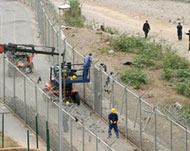Aid group: Immigrants left in desert
A leading aid group has decried the apparent abandoning of 500 immigrants in the Moroccan desert after trying to reach Spanish soil as UN Secretary General Kofi Annan expressed concern about their plight.

A day after six immigrants died trying to scale border fences to reach the Spanish North African enclave of Melilla, taking the toll from recent such attempts to 14, Spain began expelling illegal immigrants.
As 73 people were shipped to the Moroccan port of Tangiers, Medecins sans Frontieres (Doctors without Borders – MSF) said it found about 500 immigrants expelled from Melilla and its twin enclave of Ceuta in the Moroccan desert, fuelling growing international concern over the incidents.
Abandoned
“More than 500 immigrants have been abandoned to their fate in the desert in southern Morocco,” MSF said in a statement released in Madrid.
 |
|
To date, fourteen immigrants |
“Immigrant accounts say Moroccan police drove them to this zone in buses and trucks some 600km south of Oujda [a Moroccan city on the Algerian border]… following their expulsion by Spanish police from Ceuta and Melilla.”
At UN headquarters, a spokesman for Annan said he was deeply concerned at the situation and urged governments to deal with the issue humanely.
He added that the UN chief believed that “these regrettable events in this one region of the world point to a wider problem in dealing with the inevitable and necessary flow of people across borders”.
Harassment claim
Morocco’s communications minister and government spokesman Nabil Benabdellah defended Morocco’s record, telling the MAP news agency that Rabat “respects human dignity and international rules on illegal immigration”.
MSF’s director in Morocco said Moroccan security forces had harassed the group by, among other things, flying helicopters overhead.
 |
|
Some immigrants are stranded |
“They were harassing them. We witnessed a very beefed up intervention by the authorities right next to us. It was awful,” Javier Gabaldon said.
Annan earlier dubbed immigration a burning issue which had to be dealt with.
“It’s a very serious problem, a very hot issue, highly charged,” he told a news conference in the Swiss capital, Bern.
“Two hundred million people are outside their country today,” having migrated to other countries, Annan observed.
“It is two times more than 30 years ago and it is still growing. Immigration is necessary. We have to manage this problem. We have to work together,” he said.
Fair hearing
An official for Morocco’s Interior Ministry, Khaled Zerouali, said that Morocco had foiled more than 25,000 illegal immigration attempts in the past three years, including 20,000 from the sub-Saharan region.
|
“Two hundred million people are outside their country today” UN Secretary General Kofi Annan |
UN High Commissioner For Refugees Antonio Guterres said his agency was “in close consultations with the Spanish government” and working to ensure a fair hearing for genuine refugees among the hundreds of people storming the enclaves.
Earlier, the European Commission sent officials to Ceuta and Melilla, saying they would remain until Monday to evaluate the scale of immigration through Morocco and to listen to the Moroccan and Spanish authorities to see how the body can help.
MSF said among the 500 immigrants it had found were pregnant women and children, adding it had treated 50 injured people and taken six to hospital.
No food, water
The organisation added that the immigrants were stranded east of El Aouina-Souatar on the border with Algeria and had neither access to water nor food.
MSF said: “The sending back of immigrants, as agreed by Spain and Morocco, to a country which does not have minimal capacity to receive them, violates article three of the (UN) Convention against Torture.”
Spainish Foreign Minister Miguel Angel Moratinos is due to go to Morocco on Monday for talks on cooperation issues.
Spainish First Deputy Prime Minister Maria Teresa Fernandez de la Vega said Spain and Morocco had been in repeated contact regarding the deaths.
De la Vega went on to say that Morocco had given guarantees that refugees would receive treatment in accordance with the law and human rights. She added that Morocco had informed Spain that it had opened a judicial inquiry into Thursday’s deaths.